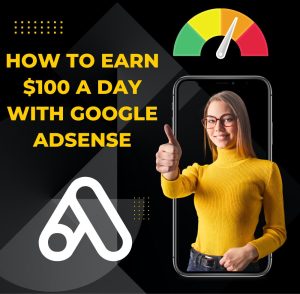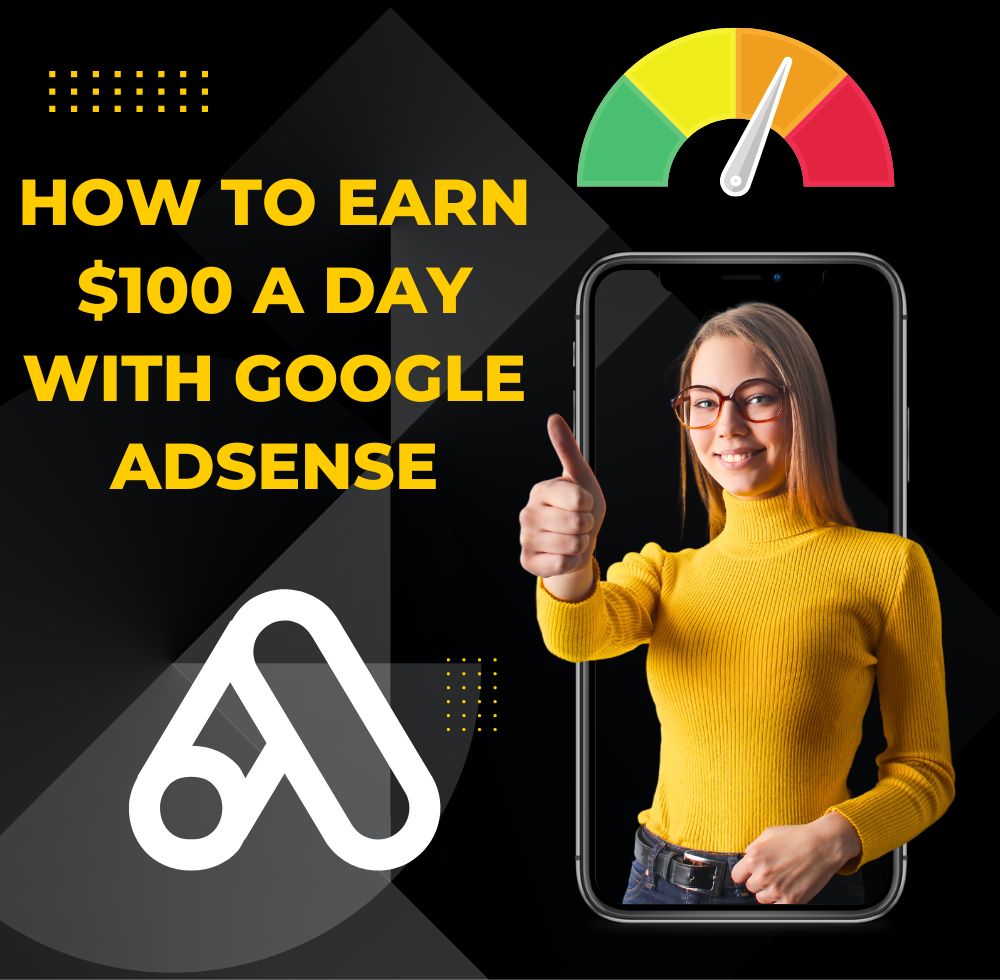To earn $100 a day with Google AdSense, optimize your website content and increase traffic to generate sufficient ad clicks. Focus on high-paying niches and maintain consistent user engagement.
Making money through Google AdSense is a popular route for website owners and bloggers striving to generate a steady income. Achieving the $100-a-day goal involves creating valuable, SEO-optimized content that attracts visitors and encourages them to interact with ads. Picking a niche with high-cost-per-click (CPC) keywords can significantly boost your AdSense earnings.
Engage your audience with quality posts, leverage social media to drive traffic, and optimize your site layout for ad placement. Remember, success with AdSense demands not only great content but also strategic marketing to expand your reach. Stand out with unique, informative articles, and regularly analyze your site’s performance to tweak strategies for maximum revenue.
Understanding Google Adsense
What Is Google Adsense?
Google AdSense is a program run by Google through which website publishers in the Google Network of content sites serve text, images, video, or interactive media advertisements that are targeted to the site content and audience. These ads are administered, sorted, and maintained by Google, and they can generate revenue on either a per-click or per-impression basis. AdSense is a user-friendly platform, ideal for beginners and experts alike, making it an invaluable asset for anyone looking to monetize their web content.Eligibility And Account Setup
To begin with AdSense, assessing eligibility and setting up an account is crucial. To be eligible, one must own a website with quality content that adheres to Google’s policy guidelines. Setting up an account is straightforward:- Visit the AdSense website and click on ‘Sign up now’.
- Enter the URL of the site you wish to monetize. Ensure your site is live and functioning.
- Fill in your payment information and details.
- Connect your site to AdSense by inserting a small piece of code into your website’s backend.
- Once Google reviews and approves your site, you can begin placing ads and earning revenue.
Choosing The Right Ad Types And Formats
Maximizing earnings with AdSense involves choosing the right ad types and formats for your website. Google provides a variety of ad types, including:- Display ads
- Text and image ads
- Link units
- In-feed ads
- In-article ads
- Responsive ads that adjust size based on the screen they’re viewed on
- Fixed-size ads for consistent design
- Auto ads where Google automates ad placement
Optimizing Ad Placement And Design
Strategic Ad Placement On Your Website
Understanding where to place ads on your site is pivotal. The goal is to insert them in locations where they are likely to attract attention and engagement. Here are some strategic spots:- Above the fold: Place ads near the top of your website to ensure visibility without scrolling.
- Below post titles: Users’ attention naturally gravitates towards headers, making it an excellent spot for an ad.
- Within content: Incorporating ads seamlessly within your article helps engage readers as they consume content.
- At the end of articles: Capture users’ attention once they finish reading with relevant ad offers.
- Sidebars: Utilize this often-unused space for additional ads.
Customizing Ad Design For Maximum Impact
Ad design customization can lead to higher click-through rates. Follow these tips:- Ensure your ads’ color scheme complements your website’s design.
- Use fonts and sizes that are easy to read.
- Experiment with both text and image ads to see which resonates best with your audience.
- Keep ad styles consistent across your site for a professional look.
Utilizing Responsive Ad Units For Diverse Audiences
Responsive ad units are critical in a multi-device world. They adapt to the screen size and orientation of the user’s device, providing a seamless experience for desktop, tablet, and mobile visitors.| Device Type | Benefits of Responsive Ads |
|---|---|
| Desktop | Ads adjust to various monitor sizes and resolutions. |
| Tablet | Optimal ad display in both portrait and landscape modes. |
| Mobile | Ads improve usability on smaller screens, enhancing potential clicks. |
Creating High-quality Content
Importance Of Valuable And Relevant Content
Quality content is the cornerstone of any successful website. Content that is both valuable and relevant to your target audience fosters trust and authority in your niche. High-quality content should solve problems, provide answers and deliver information that your audience is seeking. By focusing on delivering genuine value, your site becomes a go-to resource, which is vital for the following:- Higher Rankings: Google rewards websites that offer value with better search engine rankings.
- Increased Traffic: The more valuable your content is, the more likely users are to share it, creating organic traffic.
- Improved Ad Performance: Engaging content leads to longer visit durations, which can translate into more ad revenue.
Leveraging Seo Strategies For Organic Traffic
Optimizing your content with SEO best practices is crucial for driving organic traffic, a key factor in monetizing your site with AdSense. Utilize these strategies:| SEO Element | Action |
|---|---|
| Keywords | Research and include relevant keywords within your content in a natural way. |
| Meta Descriptions | Write compelling meta descriptions that accurately reflect the content of your page. |
| Image Alt Text | Add descriptive alt text to images, enhancing accessibility and SEO. |
| Internal Linking | Link to other relevant content on your site to keep users engaged and reduce bounce rates. |
Engaging And Retaining Visitors Through Compelling Content
To not only attract visitors but also keep them on your site, you need to craft compelling content. This involves:- Creating entertaining and informative text that captures the reader’s interest immediately.
- Structuring content with headings, subheadings, and bullet points to improve readability.
- Incorporating multimedia elements like images, videos, and infographics to complement the text.
- Providing clear calls-to-action (CTAs) that guide users to the next step, whether it’s reading another article or signing up for a newsletter.
Analyzing And Improving Performance
Utilizing Google Analytics For Ad Performance Tracking
Google Analytics is an indispensable tool for monitoring your website’s traffic and ad performance. It provides insights that are critical for identifying which pages and ads are performing well.- Set up Goals: Track conversions by setting up specific goals within Google Analytics.
- Analyze Traffic: Identify which traffic sources lead to higher ad engagement and revenue.
- Visitor Behavior: Understanding visitor behavior helps tailor content and ads to user preferences.
A/b Testing For Ad Optimization
A/B testing is a method for comparing two versions of a webpage or ad to see which one performs better. By experimenting with different ad placements, sizes, and formats, you can find the most effective setup to maximize your earnings.- Choose a Variable: Decide on one element to change, such as ad placement or color.
- Split the Audience: Ensure half of your visitors see the original ad and the other half see the modified version.
- Analyze Results: Collect data over a significant period and determine which version achieved better results in terms of clicks and revenue.
Implementing Best Practices To Boost Ad Revenue
Applying best practices in ad management can lead to a consistent increase in daily earnings. Here are some proven strategies:| Best Practice | Impact on Revenue |
|---|---|
| User-Friendly Layout: | Increases ad visibility and user engagement. |
| Content Relevance: | Ads matching content context enhance user interest and clicks. |
| Mobile Optimization: | Ensures ads perform well on mobile devices, broadening audience scope. |

Frequently Asked Questions For How To Earn $100 A Day With Google Adsense
What Is Google Adsense?
Google AdSense is an advertising platform that allows website owners to earn money by displaying targeted ads on their sites provided by Google.
How Much Traffic For $100/day?
Earning $100/day with AdSense usually requires a steady flow of thousands of daily visitors, combined with well-placed ads and high engagement.
Tips To Maximize Adsense Earnings?
Optimize your website layout for ad placement, use high-paying keywords, create quality content regularly, and monitor your analytics to improve strategies.
Earning $100 a day with Google AdSense is a realistic goal with the right strategy. Embrace diligence, creative content creation, and continuous learning to master AdSense optimization. Remember, patience and persistence are key. Start your journey today and watch your efforts translate into a rewarding passive income stream.
